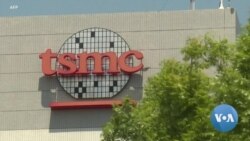Why Apple CEO Tim Cook and U.S. President Joe Biden were in the state of Arizona.
Welcome to VOA Asia Weekly. I'm Chris Casquejo in Washington. That story is coming up, but first, making headlines.
Beijing on Wednesday announced further relaxation of its tough COVID-19 restrictions that have wrecked the economy and triggered public protests. Infected people with mild or no symptoms will now be allowed to quarantine at home. Also, coronavirus test requirements for travel within the country and some public places were dropped. No later than mid-2023, China will fully re-open its border.
Chinese leader Xi Jinping arrived in Saudi Arabia on Wednesday for a visit which China hailed as its biggest-ever diplomatic initiative in the Arab world. Crown Prince Mohammed bin Salman offered Xi a lavish welcome, in contrast with the low-key reception for U.S. President Joe Biden in July.
North Korea said it fired more than 130 artillery shells into the sea off its east and west coasts on Monday after detecting military drills across the border in the South, in a continued escalation of tensions between the two countries.
Mongolia's Prime Minister met with protesters on Wednesday. They are demanding that the government hold officials accountable for the alleged theft of 385,000 tons of coal from stockpiles on Mongolia’s border with China.
Indonesia’s parliament on Tuesday banned sex outside marriage with a punishment of up to one year in jail, despite worries the laws may scare away tourists. However, it will be three years before the new criminal code comes into effect.
A South Korean cargo truck drivers’ strike continued despite an executive order to return to work and end the two week walkout. In their second nationwide walkout since June, cargo truck drivers are calling for the government to make permanent a minimum freight rate system that is due to expire at the end of the year.
U.S. President Joe Biden was in the state of Arizona Tuesday promoting investments in U.S. semiconductor manufacturing. He was joined by officials from the Taiwanese semiconductor giant TSMC, which says it is tripling its Arizona investment. VOA correspondent Michelle Quinn more.
The president’s visit to a new fabrication facility being built by Taiwanese chips giant TSMC came as the firm announced it would build a second fabrication facility and triple its investment in Phoenix to $40 billion. Biden says it is good news for TSMC’s biggest customer, Apple.
“Apple had to buy all the advanced chips from overseas. Now, they are going to bring more of their supply chain here at home. It can be a game changer.”
U.S. technology firms have long outsourced semiconductor manufacturing overseas, particularly with TSMC, the world’s largest foundry.
Calls to change that increased when the U.S. found itself scrambling for chips in the COVID-19 breakdown of supply chains.
Recent tensions with China added to the sense of urgency. China sees Taiwan as a part of its territory, and U.S. policymakers were worried about the U.S. ability to source high-end chips, essential for computers, smartphones, cars, fighter planes and data centers.
So, the Biden administration is pushing for the most cutting-edge chips to be made in the U.S. Ahead of his visit, TSMC announced it would ratchet up the kind of technology it makes in Arizona beyond the 4-nanometer technology slated to begin production in 2024 by producing 3-nanometer technology in its second fabrication facility by 2026. Those advanced chips deliver faster processing and use less power.
“This state-of-art manufacturing facility behind us is a testimony that TSMC is also taking a giant step forward to help build a vibrant semiconductor ecosystem in the United States.”
The company, which had said it would hire 2,000 workers, now says it will employ 4,500.
Michelle Quinn, VOA News.
Visit voanews.com for the most up-to-date stories. You’re watching VOA Asia Weekly.
Finally, with the launch of two electric vehicle models Wednesday, Tesla made its first attempt to break into Thailand’s auto industry.
Through tax cuts and subsidies, Thailand is encouraging EV adoption and production. By 2030, the government wants at least 30 percent of vehicles produced in the country to be electric.
Thanks for watching VOA Asia Weekly. I’m Chris Casquejo. Until next week.











